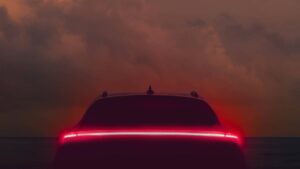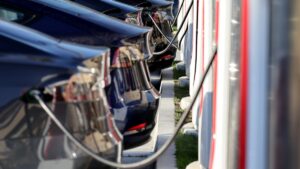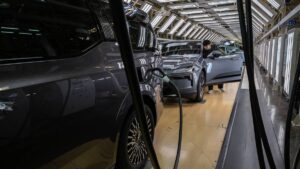Musk’s Tesla shunned in new EV wave

Tesla cops the cold shoulder treatment as it loses ground to cheaper alternatives. Pic via Getty Images
Electric vehicles are having a resurgence in Australia, with new data from Carsales showing interest is rising again following a prolonged slump, but Elon Musk is not a beneficiary of the renewed enthusiasm.
While the majority of Australians are still planning for the next car they buy to be petrol – with Generation Z still “emotionally attached” to the vehicles, citing sound, aesthetics and cultural identity – more people are warming to EVs.
The Carsales data, based on a survey of almost 3000 Australians, show the number of Australians intending to buy an EV has jumped from 30 to 37 per cent since last November – the first increase in more than three years.
But Tesla’s dominance has waned, as chief executive Elon Musk has faced a fierce backlash over his support for Donald Trump – a relationship that has since imploded, weighing on the US carmaker’s profits and shares, which have fallen more than 23 per cent in the past six months.
The Carsales data shows that Tesla brand conversion has dropped from 44 to 31 per cent, and now ranks 12th overall, as it loses ground to cheaper Chinese brands.
As Mr Trump imposes retaliatory tariffs on Chinese imports, Australia – with its 10-year-old free-trade agreement with Beijing and therefore no trade barriers – has become a haven for Guangzhou-made electric vehicles.
BYD has overtaken Tesla as the world’s top-selling EV maker, and boasts 63 per cent brand conversion – the highest of all brands – in Australia, according to the Carsales data.
Carsales data services director Ross Booth said Tesla had enjoyed unrivalled dominance for years in Australia, despite offering limited models.
“If you go back four years – and four years is not a long time – there were only 21 battery electric vehicles (models) for sale in the Australian market. Last year, there were 80, and we predict 134 by the end of the year,” Mr Booth said.
“What people miss is Tesla’s dominance. Even last year, Tesla sold 42 per cent of every battery electric vehicle sold in Australia as new – with only two models. So out of 80 models, Tesla sold 42 per cent of the market with just two.
“Even today, over 55 per cent of every battery electric vehicle on the road in Australia is actually Tesla. So the Australian battery vehicle market is dominated by Tesla. But that is changing.”

Mr Booth said Australians wanted more choice and cheaper options. This has created fertile ground for Chinese brands to plough.
“The reality is there’s so much more choice out there that Tesla sales are dropping. There’s so many more models that you can actually get, and a lot of the brand-new battery vehicles from China are actually really good quality.
“The other thing is, people tend to talk about Chinese EVs when in actual fact a lot of EVs are made in China from non-Chinese brands. Tesla’s a great example. A lot of Teslas come from China. The Kia EV3 comes from China. All Volvos, the majority of them, come from China. BMW EVs come from China. So when I hear Chinese EVs, people don’t really understand that most of the technology is based in China.
“So Chinese EVs aren’t bad, they’re actually very good. Having said that, there are different quality levels, as there is with ICE (internal combustion engines).”
But the Carsales data shows more current EV owners were less likely to go electric again, with 83 per cent saying they would buy another one versus 95 per cent in 2023. This has been mainly the result of depreciation, with the trade in prices plummeting as cheaper new EVs become more plentiful and existing models are discounted.
The data also shows 59 per cent of Generation Z – those born from the mid-1990s to the early 2010s – were still “emotionally attached” to petrol vehicles, with 39 per cent concerned about how electric cars look. This compares to 21 per cent for the national average.
Still, EV consideration has jumped from 21 to 31 per cent among Generation Z.
Mr Booth said perceived range and time to charge remained a top concern, but as battery technology improved in the next four years, he predicted EVs to travel more than 1000km on a single charge.
“And it would take you 10 minutes to charge to 80 per cent. That is what’s coming.”
Tesla stores attracted at times violent protests over Mr Musk’s support of Mr Trump. But the pair’s relationship imploded over the President’s sweeping tax and spending bill, which Mr Musk called a “disgusting abomination”.
This article first appeared in The Australian as Inside Elon Musk’s China problem, as cheaper brands take off in Australia
Related Topics
UNLOCK INSIGHTS
Discover the untold stories of emerging ASX stocks.
Daily news and expert analysis, it's free to subscribe.
By proceeding, you confirm you understand that we handle personal information in accordance with our Privacy Policy.








